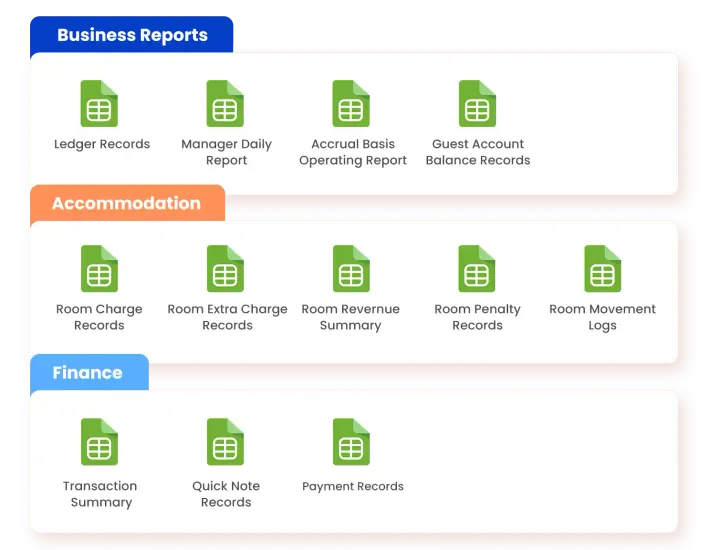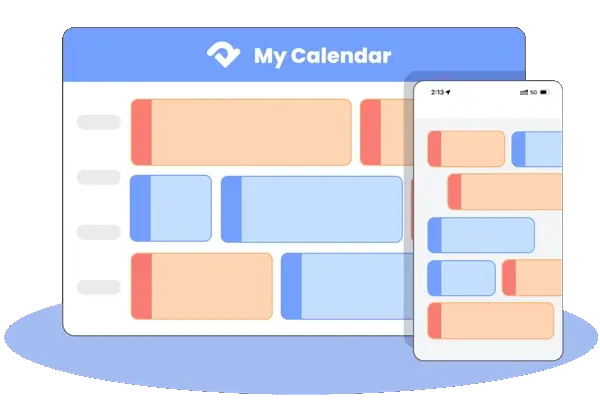In the competitive world of hospitality, success isn't just about offering a comfortable bed or a friendly smile. It’s about making smart decisions based on accurate, real-time information. At the heart of this process is the hotel Daily Operation Report, a powerful tool generated by a Property Management System (PMS). This isn’t just a simple printout; it’s a detailed summary of a hotel’s daily performance, providing managers with the insights needed to guide their business.
A PMS serves as the central nervous system for a hotel. It handles everything from reservations and check-ins to housekeeping and billing. The various PMS reports it produces are the data that gives a clear picture of the property’s health. By carefully reviewing these reports, a hotel’s management team can identify trends, optimize operations, and make strategic choices that directly impact profitability and guest satisfaction.
Key PMS Daily Reports and How Hotels Use Them
Front Desk and Guest Management Reports
The front desk is the face of the hotel, and its staff relies heavily on PMS reports to keep guest interactions smooth.
- Arrival and Departure Reports
This report consolidates all essential details about guests arriving and departing on a given day, serving as a roadmap for the front desk to manage guest flow effectively.
- Data to focus on: Number of arrivals/departures, specific check-in/check-out times, room type requests, special needs (e.g., accessibility, extra beds), booking source, and guest contact details.
- Primary: Ensures the front desk is prepared for guest arrivals and manages departures efficiently. Helps avoid long wait times and ensures guest preferences are met.
- Usage scenarios: When planning daily staff shifts at the front desk to handle peak arrival times. When preparing welcome amenities or special requests (like birthday surprises) for incoming guests. When coordinating with housekeeping to ensure rooms are ready before check-in. When managing late check-out requests to avoid conflicts with new arrivals.
- Reservation Source Reports
This report tracks where bookings originate, offering a clear picture of which channels are driving business and their associated costs.
- Data to focus on: Percentage of bookings from each channel (direct website, OTAs, walk-ins, corporates), conversion rates per channel, and associated fees (e.g., OTA commissions).
- Primary: Guides marketing and distribution strategies to optimize booking channels and reduce costs.
- Usage scenarios: When deciding whether to run a same-day promotion for walk-ins if their numbers are low. When adjusting commission budgets for OTAs based on their current contribution. When training front desk staff to encourage direct bookings (e.g., offering discounts for future stays booked via the hotel website).
- Guest Feedback Snippets
This report compiles quick insights from guest interactions and post-stay feedback, highlighting what’s working well and what needs improvement.
- Data to focus on: Ratings (1–5 stars), common complaints (e.g., noise, slow service), positive comments, and specific guest names/room numbers.
- Primary: Enables immediate resolution of issues and improves long-term service quality. Builds guest loyalty by showing their feedback is valued.
- Usage scenarios: When a guest mentions a broken air conditioner in their room—staff can dispatch maintenance immediately. When multiple guests complain about slow check-ins, the front desk can streamline the process (e.g., pre-printing registration cards). When a guest leaves a positive comment about a staff member, managers can recognize that employee.
Housekeeping and Room Operations Reports
Clean, well-maintained rooms are non-negotiable for guest satisfaction. PMS reports help housekeeping teams work faster and smarter.
- Room Status Reports
This report provides real-time updates on the condition and availability of every room, ensuring housekeeping and front desk teams are aligned on room readiness.
- Data to focus on: Current room status (occupied, vacant, dirty, clean, out of order), time since a room was vacated, and scheduled check-in times for vacant rooms.
- Primary: Prioritizes cleaning tasks to ensure rooms are ready for incoming guests. Prevents overbooking by providing real-time availability.
- Usage scenarios: When a group of rooms is vacated at the same time, housekeepers can prioritize those with early check-in times. When a room is marked “out of order” due to a leak, the front desk avoids assigning it to new guests. When a guest requests an early check-in, staff can check which rooms are already clean and available.
- Minibar and Amenity Reports
This report monitors the usage and stock levels of minibar items and in-room amenities, ensuring guests have what they need and charges are accurate.
- Data to focus on: Items consumed from minibars, quantity of each item used, restock needs (e.g., towels, toiletries, coffee pods), and discrepancies between usage and billing.
- Primary: Ensures minibars are restocked and amenities are fresh for new guests. Guarantees accurate billing for consumed items.
- Usage scenarios: When a guest checks out, housekeepers use the report to restock minibar items before the next guest arrives. When a guest disputes a minibar charge, the front desk can reference the report to show exactly what was consumed. When certain amenities (like eco-friendly toiletries) run low, housekeeping can reorder them in bulk.
Financial and Revenue Reports
Money management is a critical part of hotel operations, and PMS reports keep finances transparent and accurate.
- Night Audit Reports
This report finalizes the day’s financial transactions, reconciling all revenue and expenses to ensure the books are accurate and complete.
- Data to focus on: Total daily revenue, breakdown by category (rooms, F&B, services), tax amounts, payment method totals (cash, credit card), and transaction errors.
- Primary: Closes the day’s financial records, identifies discrepancies, and ensures all transactions are accounted for.
- Usage scenarios: When the total cash in the front desk drawer doesn’t match the reported cash transactions, the audit team can investigate missing funds. When tax calculations are incorrect, accountants can adjust them before finalizing daily records. When a guest’s credit card is declined, staff can follow up to resolve the payment.
- Daily Revenue Breakdowns
This report breaks down revenue by department and compares performance to daily targets, helping managers spot trends and make quick adjustments.
- Data to focus on: Revenue per department (rooms, restaurant, spa, events), average spend per guest, and variance from daily targets.
- Primary: Tracks financial performance against goals. Identifies underperforming areas to adjust strategies (e.g., promotions, staffing).
- Usage scenarios: When restaurant revenue is 30% below target, managers can launch a last-minute dinner special. When spa bookings are low, front desk staff can upsell spa services to checking-in guests. When room revenue is high, managers might allocate extra budget to room maintenance to maintain quality.
Food and Beverage (F&B) Reports
Restaurants, bars, and room service are big revenue drivers for hotels, and PMS reports help optimize these operations.
- F&B Sales and Turnover Reports
This report tracks sales performance, customer flow, and popular menu items, helping F&B teams optimize service and inventory.
- Data to focus on: Top-selling menu items, table turnover rates (per hour), average check amount, and peak busy times.
- Primary: Optimizes staffing, inventory, and menu offerings to boost sales and improve guest wait times.
- Usage scenarios: When a certain dish sells out every night, the kitchen can prepare larger batches. When table turnover is slow during lunch, servers can be trained to speed up service (e.g., taking orders more promptly). When the bar is busy from 7–9 PM, managers can schedule extra bartenders during those hours.
- Inventory and Wastage Reports
This report tracks how much food and drink is used versus wasted, helping reduce costs and support sustainable practices.
- Data to focus on: Quantity of ingredients used vs. wasted, expiration dates, and cost of wasted items.
- Primary: Reduces food costs and supports sustainability by minimizing waste. Improves inventory management.
- Usage scenarios: When a particular vegetable is frequently wasted, the chef can adjust menu items to use it more efficiently. When dairy products are expiring quickly, the kitchen can order smaller quantities more frequently. When overall waste costs are high, staff can be trained on portion control.
Best Practices for Using PMS Reports
To get the most out of your hotel Daily Operation Report, a few best practices are essential.
- Make it a Daily Routine: Reviewing reports should be a non-negotiable part of the morning ritual. Consistent analysis helps managers spot trends and issues early.
- Prioritize Data Accuracy: The reports are only as good as the data entered into the system. Staff must be trained to meticulously enter all information—from guest names to charges—to ensure the reports are reliable.
- Encourage Communication: Managers should share relevant information from the reports with their teams. The front desk staff should know the housekeeping status of a room, and the restaurant manager should be aware of the day’s expected occupancy to prepare for dinner service.
- Focus on Actionable Insights: Don’t just read the numbers; use them. If the revenue report shows low spa sales, brainstorm a new marketing plan with the spa manager. If the housekeeping report reveals a recurring issue with a specific room, schedule maintenance to address it.
Conclusion
The PMS report is more than just a summary of numbers; it’s a strategic asset. By understanding and effectively using the various daily operation reports, hotel managers can optimize their pricing, streamline their operations, and deliver an exceptional guest experience. These reports are the foundation for smart decisions and, ultimately, the key to a thriving and profitable hotel business. They transform raw data into a clear roadmap for success, guiding a hotel through the complexities of daily operations and ensuring it is always a step ahead.

